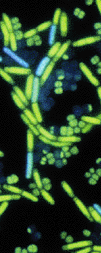DePauw
University
Fall 2017
Instructor:
Chet Fornari
SOC: 3017
BIO 250A
Introduction to Microbiology
With a focus on microbes in disease, the microbiome, applied fermentations, antibiotics and basic microbial techniques
Lecture 9:10-10:10 MWF Olin 205; Lab 1:00-3:30 T,Olin 224
My Office/phone: 232 Olin; 658-4781
email: cfornari@depauw.edu
click here for all registration info
Lab Supervisor: Wendy Tomamichael
Office: Olin 229; phone: 658-4774
- Course Objectives
- Rationale for Course Design & Organization
- Tips for Success
- Attendance & Grading Policies
- Lecture Topics and CRAaP
- Lab syllabus
- Links to Microbiology and Molecular Biology sites
- Class Pictures

